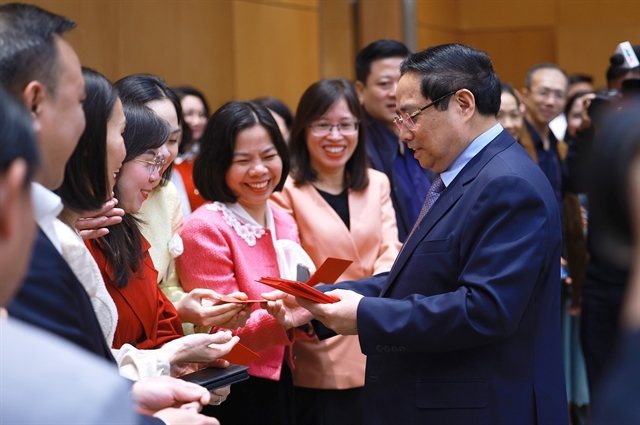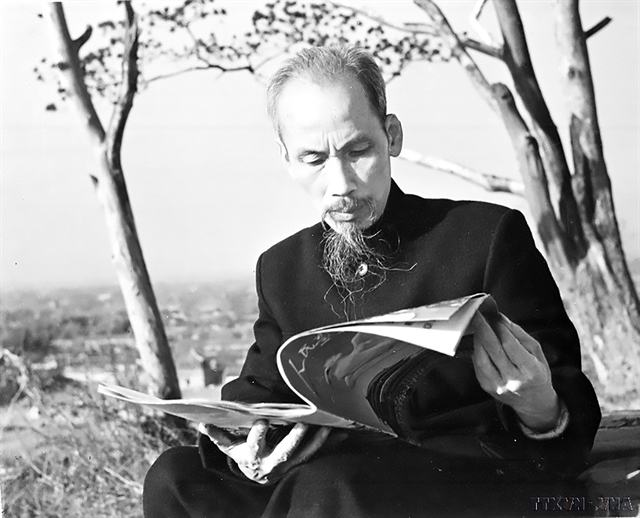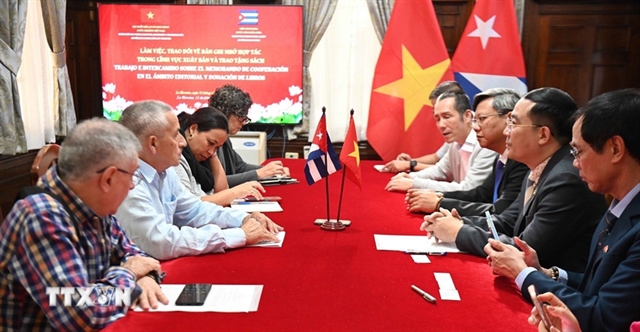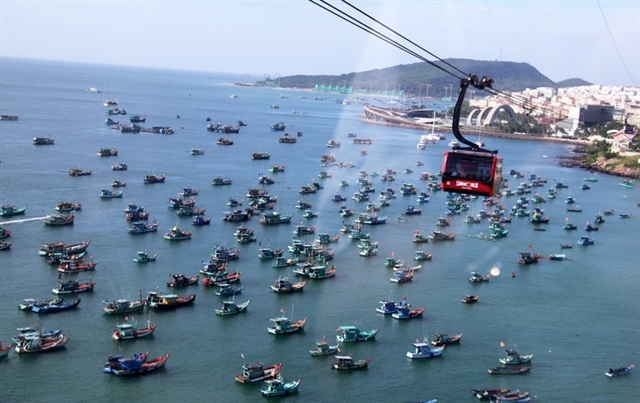 Politics & Law
Politics & Law

 |
| President Hồ Chí Minh reads a newspaper in front of his guesthouse during a visit to China in 1953. He was not only a journalist, but also an active and dedicated reader of both domestic and international newspapers. He cultivated a disciplined and serious habit of reading the press regularly as part of his daily routine. VNA/VNS File Photo |
HÀ NỘI President Hồ Chí Minh’s simple, humble, friendly and approachable demeanour left a deep impression on everyone and became a shining example for all Communists to follow, said Ling Dequan, a former Chinese student who studied in Việt Nam and later served as Head of the Xinhua News Agency bureau in Hà Nội.
Speaking to Vietnam News Agency in Beijing on the occasion of the 135th birth anniversary of President Hồ Chí Minh, Ling, recalled his vivid memories of the Vietnamese leader.
Having met Uncle Hồ several times during his student years in the 1960s, the researcher said he would never forget the encounter on October 3, 1964 at the Presidential Palace.
That day, President Hồ Chí Minh warmly welcomed over 30 young Chinese students who had newly arrived in Việt Nam.
He appeared in a plain brown bà ba shirt and rubber sandals—clothing that struck Ling as exceptionally modest for a head of State.
“He looked more like a kindly village elder than the leader of the country,” Ling said.
When Chinese Ambassador Zhu Qiwen suggested the students sing 'Ode to Hồ Chí Minh', the President gently declined and instead invited everyone to sing 'The East is Red', a popular Chinese revolutionary song at the time.
Although six decades have passed, Ling said these gestures perfectly reflect Hồ Chí Minh’s noble character—frugal, humble and always devoted to fostering strong bonds with Chairman Mao Zedong, the Chinese Communist Party and the Chinese people.
According to Ling, these were ties of a true “comradeship and brotherhood” between the two nations.
“I was only 18 years old when I first came to Việt Nam in 1964. Now I’m nearly 80,” Ling reflected emotionally.
“After President Hồ Chí Minh passed away, I returned to Việt Nam many times and paid my respects at his mausoleum.”
According to Ling, Hồ Chí Minh’s concept of unity operated on three levels: within the Party, among the people and internationally.
He also noted that combining national strength with global trends is a consistent principle of Việt Nam under Hồ Chí Minh’s Thought.
“Whether during the war or in 40 years of Đổi Mới (reform), this approach has proven effective and remains relevant today,” he said.
Legacy draws admiration
In Italy, veteran journalist Massimo Loche, shared his admiration for President Hồ Chí Minh.
He is a former war correspondent in Việt Nam during the 1970s, who worked with outlets like l’Unità, Rinascita and l’Espresso,
Having worked in Hà Nội from late 1972, Loche was deeply touched by the Vietnamese people’s love for a leader they simply called 'Uncle Hồ'.
He regretted never meeting him personally, but remembered chanting Hồ Chí Minh’s name in solidarity protests with thousands of Italian youth.
He proudly attended the inauguration of the Hồ Chí Minh Mausoleum and paid respects to the President multiple times.
Through personal research, Loche discovered that Nguyễn Ái Quốc (an early alias of Hồ Chí Minh) had lived in Belgium, Germany, Switzerland and Italy during his quest for national liberation.
In the early 1930s, he briefly worked in Milan, at the restaurant Antica Trattoria della Pesa, which had a statue dedicated to Hồ Chí Minh erected in 2012.
After Việt Nam declared independence on September 2, 1945, its socialist path drew great interest from the Italian communist left, which grew stronger as Việt Nam defended its sovereignty against colonial France and imperialist America.
During the harshest years of war, President Hồ Chí Minh, like General Võ Nguyên Giáp, became a symbol for oppressed peoples across Asia, Africa and Latin America—the so-called third world —fighting for liberation from colonialism and imperialism.
From being a little-known country, Việt Nam rose to become a symbol of resistance for generations of Italians.
Today, numerous books about Hồ Chí Minh and Việt Nam have been published in Italian, including 'Letters of President Hồ Chí Minh' and 'The Revolutionary Path'.
Some Italians have even compared him to Giuseppe Garibaldi, the 19th-century hero of Italy’s unification.
Loche concluded that even nearly a century later, memories of Hồ Chí Minh’s time in Italy remain deeply valuable.
With a noble, humane character and an unshakable will to liberate his nation, President Hồ Chí Minh’s legacy continues to inspire admiration worldwide, he said. VNS




